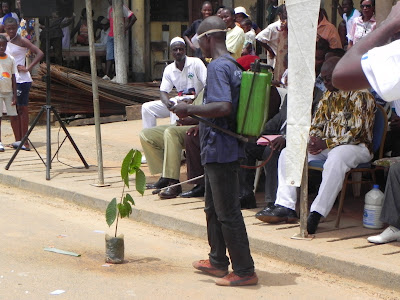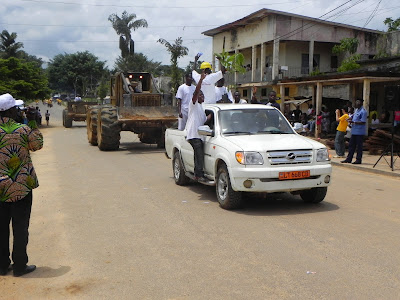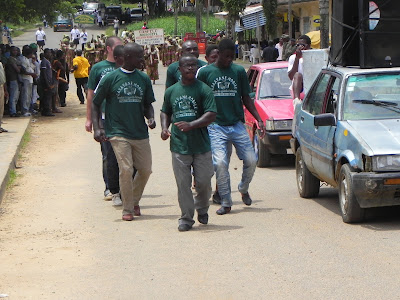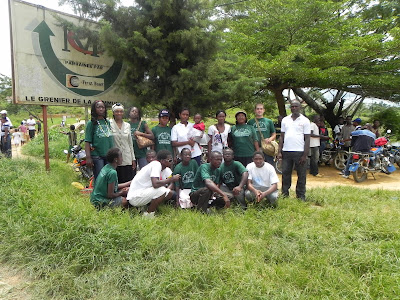The first time I went to see the “Pygmies” dance I was tired, and because Florence was busy most of the night speaking with people as it was her Father's funeral I was not able to ask her too many questions about exactly what was going on. She is one of the few people around here who can speak their padtwa, and has an understanding of their culture. Granted seeing all of the singing and dancing was cool enough, but when you know the story behind everything it makes it all a lot more interesting.
 |
| The Pygmy encampment |
This time I went out to visit a “Pygmy” encampment, and learned that it is generally the Gyele, but more specifically the Bapubu people who live here close to Lolodorf. My post mate Amanda (community health volunteer) is about to complete her service, and she wanted to go out to stay in an encampment before she left. My other post mate Barret (teaching volunteer) also made the trip out with us. This was not exactly a place you might go on a tour bus. We where able to go visit only because Florence had worked with these people as a civil servant, and knows many of them. The encampments are mostly small groups of 3-7 houses spaced out by several kilometers out in the middle of the forest. We had to go out to her village by moto, and then hike into the forest on foot. As we approached each encampment we had to make sure that she was in front because she knew them, and their language. In order to come out and stay we had to bring gifts. We brought 30 kilos of frozen fish, 30 kilos of rice, soap, cigarettes, matches, and alcohol amounting to about 120 dollars between three of us volunteers. All of that was more than a bit extravagant to buy given our pay grade, but I thought it was well worth it. Their hospitality did however include giving us a plate of smoked rat that was offered as we ate the dinner we had packed in.
We had to stay the night because the Bapubu people are in certain ways nocturnal. They only dance, hunt, and travel at night. The dance that I saw the first time, and again when we went out to the encampment is called the Bapea. I have to say first and foremost that all of my interpretations of it, and its social connotations are translated through Florence, who is not Bapubu but Ewondo, and then again through me. In other words, like anyone else who is not Bapubu I can't really understand everything that was going on so you are only getting my limited view.
During the Bapea the young women of the village line up on a long piece of timber called a ntang which they beat on like a drum while they sing. There is also a drum that is about 3.5 feet tall and is played only by the men (with the aid of a stool) called a kaa that accompanies the women. The significance of the dance seems to me to be the playing out of a drama between the men and women of the community who because it is such a traditional society have very different roles and status. This is a polite way of saying that women are treated like animals, and things like sexual assault and spousal abuse are disturbingly common.
 |
| The dancer pouting for the women |
This drama plays out between the chorus of young women, and the single unidentified young male dancer. He is called the Mbapea, or the man dancing the Bapea, and his entire body is supposed to be covered by his costume. Specifically the hands, feet, face, penis, and ass are covered (apparently how the women might identify him) so that no one knows which of the men it is. The costume uses specific plants in the forest, and must be made new each time the dance is performed, however throughout the night several dancers can wear it. The dancer seems to be the avatar for the whole of Bapubu maleness when he dons this costume. The Mbapea is not allowed to speak except through whistling, and his by his movements. He does however convey to the the chorus a considerable amount. By at times feverishly dancing, or pouting at the woman's lack of boisterousness he whips the chorus into a frenzy of shouted singing and drumming.
The discourse comes in the lyrics of the songs, each a story. One of the songs that they sing over and over is a lamentation of a daughter to her mother. The daughter is explaining to her mother that she will abandon her marriage, and the lyrics are an enumeration of the husbands wrongs “I go to the farm, and he beats me, when I am in the kitchen, he beats me, I try to love him, and he beats me, I do anything, and he beats me.” It is easy to understand the force with which the women play the ntang, and the frenzied screams they fall into while singing this song when one knows the meaning of the lyrics. This song always brought the most dramatic dancing from the Mbapea who would try, quite extravagantly to appease the women. At times he would stop apparently mid convulsion straight as a board, fall flat on his face not catching himself with his hands, and then spring up and continue as if he had not felt a thing.
Another song that was repeated had lyrics that simply affirmed traditions. It was the only song in which the women where allowed to get up and dance with the Mbapea, however they had to make sure not to touch him. This song came up more and more often at the end of the night. This seemed to be symbolic conciliatory ending to the airing of grievances by the women through dance, and their acceptance of the traditions.
Aside from the Mbapea there was another dancer who is supposed to be more of a comic figure. He was dressed slightly differently, however completely covered like the Mbapea. His name is the Bigueal. Throughout the night he was skiddish, and only rarely came to the fire to dance. The rest of the night he could be dimly seen peeking around a tree, or the corner of a hut. When he approached the fire he would rush in, and dance in a disordered frenzy for a few minutes, and then disappear again. To an untrained eye his dance was similar to the Mbapea, however all of the Bapubu found him quite funny. He is meant to be a comic symbol of the Bageale people. This is a closely related Gyele people who live closer to the coast in the Kribi area. The languages of the two peoples are almost the same, however they regard each others manner of speaking, and lifestyle as comical. This was explained by Florence as similar to the way we find small differences between ourselves and the British funny. This can be contrasted with the Baka people (also “pygmies”) who live in the East region and have a completely different language, and customs.
Traditionally, at the end of the night, just before dawn the Mbapea runs from the fire and finds an oil palm tree. The chorus follows him from the fire continuing to sing as he climbs the oil palm to the topmost frawns (I feel this requires a bit of an explanation. Palm frawns are very thorny, and without gloves very hard to handle, let alone climb through. In other words, this is a feat that is accomplished with no small amount of pain or injury). While hidden by the frawns he takes off the costume and escapes unseen into the bush naked. From that point on the women of the village are not allowed to eat the oil from that tree, or when it is cut down for palm wine, drink it.
This whole thing plays out as the night goes on, but we all retired at around two in the morning to sleep in one of their huts. The women continued to sing, and the men danced throughout the night, and finished all of the 10 some odd liters of liqueur we brought. Remember these are not large people, nor was this that large of a group. At 6:30 in the morning when we woke up everyone had already woken, or was still up, and didn't seem to quite understand our grogginess. We packed our things and left to a song bidding us farewell.
 |
| Here is a picture of Amanda and a monkey. |











































